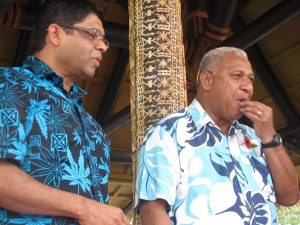Fiji’s attorney general, one of the most powerful politicians in the country, is facing calls to stand down from office in the wake of allegations he was involved in two bomb attacks against a political rival in the late 1980s.
Known as “A-to-Z” because of his range of government portfolios, Aiyaz Sayed-Khaiyum late last month submitted to an interview with the Criminal Investigation Department in Suva over the allegations. In addition to being the highest law enforcement officer in the country, he is also the minister for justice, aviation, climate change, communication, economy, public service and anti-corruption, and is the secretary-general of the governing FijiFirst party.
Sayed-Khaiyum has not commented publicly on the allegations, saying only that “we will let the due process take its course.”
Formal complaints were filed with Fiji police in July by 47-year-old Suva woman Veronica Malani, her father, Ratu Filimore Ralogaivau, a former parliamentarian, and her brother, Ratu Benedito Ralogaivau, a police officer residing in Australia.
According to the Guardian, the complaints allege that Sayed-Khaiyum, then 22 years old and part of an Indo-Fijian pro-democracy group known as the Fiji Freedom Fighters, planted the bombs, which killed one bystander and caused “severe injuries” to members of the Ralogaivau family in October 1987.
The first attack came on October 17, 1987, while Ratu Benedito, then 13 years old, and his mother were waiting for a bus in Suva City.
“I observed a young male in his early 20s approach us… place a box on the ground near my mother… then walk away,” Benedito told police. “I observed my mother slumped… her dress was ripped, and she was bleeding from her right cuff. There were severe burns and blood pouring out of her wound.”
The following day, the family was targeted at their home, with Malani, 14 years old at the time, telling police she saw Sayed-Khaiyum throw a homemade bomb into the driveway.
“I was standing on our driveway with my mum at our Suva home when a car drove past and threw a package down our driveway which instantly exploded,” Malani alleged in her statement to police. “We were seriously injured and taken to hospital. My right thigh and the right side of my body were badly injured and burned.”
The incidents came in the aftermath of Fiji’s 1987 military coup, in which Major General Sitiveni Rabuka took control of the government in what he said was an effort to stop the Indo-Fijian community from taking political control of the country. Indo-Fijians, the second largest ethnic group in Fiji behind the indigenous iTaukei people, are descendants of Indian servants brought to Fiji by the British.
It’s suspected that the Ralogaivau family was targeted due to Ratu Filimore splitting with the elected Coalition party to take up the position of education minister in Rabuka’s post-coup government.
According to the Fiji Sun, two people were charged with the bombings following the initial police investigation, but both were later given immunity. One of the men is believed to have since left the country.
Acting Commissioner of Police Rusiate Tudravu asked for patience from the public as police continue to investigate the matter.
“We are asking members of the public to be mindful of the fact that this is a report of an allegation that dates back more than three decades so it will take time for investigators to conduct their work,” he said.
But former prime minister and Fiji Labor Party leader Mahendra Chaudhry told RNZ that Tudravu’s repeated assurances of “a thorough investigation” over the last five months without producing any results were unacceptable.
“Questions put to them about whether they have questioned the attorney-general and what is the situation with the investigations are being answered in a very evasive manner… I see this is a case where the police are just buying time to sweep the matter under the carpet in due course,” he said.
Chaudhry added that to allow for a credible investigation, Sayed-Khaiyum needed to step down as attorney general.
“This is a matter of concern, now that it’s been confirmed that the matter is being investigated by police, the attorney-general should step aside. He should step down to enable a credible investigation to take place. But of course, he’s still there.”
































